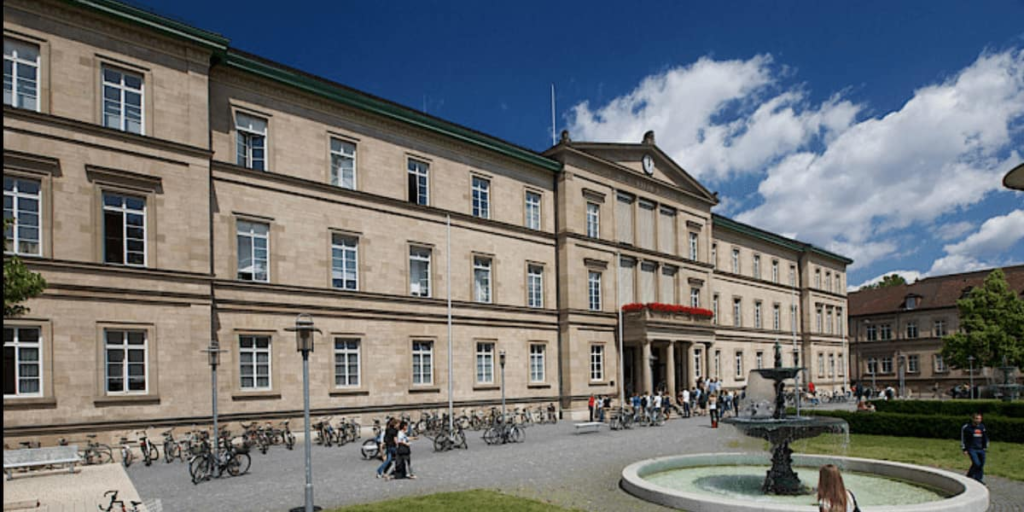If you’re considering studying in Germany, you’re in luck! Germany is home to some of the best universities globally, offering world-class education with low or no tuition fees for international students. The top 10 universities in Germany include prestigious institutions such as the Technical University of Munich (ranked 50th globally), Ludwig Maximilian University of Munich (LMU), and Heidelberg University. Whether you’re interested in engineering, business, or the arts, Germany’s higher education institutions provide a broad range of programs with strong academic reputations, diverse student populations, and cutting-edge research opportunities. In this guide, we’ll take you through the top 10 universities in Germany that stand out for their quality, affordability, and opportunities for international students.
10 Best Universities in Germany
1. Technical University of Munich (TUM)
The Technical University of Munich (TUM), founded in 1868, is a leading technical university located in Munich, Bavaria. Known for its excellence in engineering, natural sciences, and technology, TUM offers a strong focus on interdisciplinary research and innovation. The university provides extensive support for international students, including orientation programs, language courses, and cultural activities.

| Fact | Detail |
| World Ranking | #50 (QS World University Rankings 2024) |
| Number of Students | 48,000 |
| International Students | 30% |
| Tuition Fees | Free (administrative fees around €142 per semester) |
| Average Graduate Salary | €50,000 per year |
2. Ludwig Maximilian University of Munich (LMU Munich)
Founded in 1472, Ludwig Maximilian University of Munich (LMU Munich) is one of Europe’s leading research universities. Located in the heart of Munich, LMU is renowned for its academic excellence and rich history, offering strong programs in humanities, social sciences, natural sciences, and medicine. The university’s robust research environment and interdisciplinary collaboration result in significant contributions across various fields.

| Fact | Detail |
| World Ranking | #64 (QS World University Rankings 2024) |
| Number of Students | 51,000 |
| International Students | 15% |
| Tuition Fees | Free (administrative fees around €144 per semester) |
| Average Graduate Salary | €48,000 per year |
3. Heidelberg University
Founded in 1386, Heidelberg University is Germany’s oldest university and one of the oldest in Europe. Located in Heidelberg, Baden-Württemberg, the university is renowned for its research-intensive environment and strong emphasis on the humanities and sciences. Heidelberg University boasts numerous notable alumni, including 29 Nobel laureates.

| Fact | Detail |
| World Ranking | #66 (QS World University Rankings 2024) |
| Number of Students | 30,000 |
| International Students | 20% |
| Tuition Fees | €1,500 per semester for non-EU students |
| Average Graduate Salary | €47,000 per year |
4. Humboldt University of Berlin
Humboldt University of Berlin, founded in 1810, is one of the most prestigious universities in Germany. Located in the capital city of Berlin, the university is known for its strengths in the humanities, social sciences, and natural sciences. The vibrant campus life and extensive research facilities make it a popular choice for both local and international students.

| Fact | Detail |
| World Ranking | #128 (QS World University Rankings 2024) |
| Number of Students | 35,000 |
| International Students | 18% |
| Tuition Fees | Free (administrative fees around €315 per semester) |
| Average Graduate Salary | €45,000 per year |
5. Freie Universität Berlin
Freie Universität Berlin, established in 1948, is one of Germany’s top research universities. Located in Berlin, it is particularly strong in the social sciences, humanities, and natural sciences. The university is known for its commitment to research and international collaborations, providing students with numerous opportunities to engage in cutting-edge projects.

| Fact | Detail |
| World Ranking | #111 (QS World University Rankings 2024) |
| Number of Students | 32,000 |
| International Students | 20% |
| Tuition Fees | Free (administrative fees around €311 per semester) |
| Average Graduate Salary | €44,000 per year |
6. RWTH Aachen University
Founded in 1870, RWTH Aachen University is a leading technical university located in Aachen, North Rhine-Westphalia. It is highly regarded for its engineering and technology programs. The university has strong industry connections, providing students with numerous internship and employment opportunities in various engineering fields.

| Fact | Detail |
| World Ranking | #144 (QS World University Rankings 2024) |
| Number of Students | 47,000 |
| International Students | 23% |
| Tuition Fees | Free (administrative fees around €299 per semester) |
| Average Graduate Salary | €49,000 per year |
7. University of Freiburg
The University of Freiburg, established in 1457, is one of the oldest and most prestigious universities in Germany. Located in Freiburg im Breisgau, Baden-Württemberg, the university is known for its strengths in humanities, social sciences, and natural sciences. The campus environment is vibrant and welcoming, providing a rich cultural and academic experience.

| Fact | Detail |
| World Ranking | #172 (QS World University Rankings 2024) |
| Number of Students | 25,000 |
| International Students | 18% |
| Tuition Fees | €1,500 per semester for non-EU students |
| Average Graduate Salary | €46,000 per year |
8. University of Tübingen
Founded in 1477, the University of Tübingen is located in Tübingen, Baden-Württemberg. It is renowned for its strengths in medicine, law, and theology. The university provides excellent student support services, including career counseling, language courses, and integration programs for international students.

| Fact | Detail |
| World Ranking | #173 (QS World University Rankings 2024) |
| Number of Students | 28,000 |
| International Students | 16% |
| Tuition Fees | €1,500 per semester for non-EU students |
| Average Graduate Salary | €45,000 per year |
9. University of Göttingen
Founded in 1737, the University of Göttingen is located in Göttingen, Lower Saxony. It is a research-intensive university known for its strengths in natural sciences, social sciences, and humanities. The university has a strong reputation for research excellence and has produced numerous Nobel laureates and prominent scholars.

| Fact | Detail |
| World Ranking | #188 (QS World University Rankings 2024) |
| Number of Students | 30,000 |
| International Students | 13% |
| Tuition Fees | Free (administrative fees around €370 per semester) |
| Average Graduate Salary | €43,000 per year |
10. University of Hamburg
The University of Hamburg, established in 1919, is one of the largest and the Best universities in Germany. Located in Hamburg, the university offers a wide range of programs across various disciplines, including humanities, social sciences, and natural sciences. The strategic location in Hamburg provides students with numerous cultural and professional opportunities.

| Fact | Detail |
| World Ranking | #228 (QS World University Rankings 2024) |
| Number of Students | 43,000 |
| International Students | 12% |
| Tuition Fees | Free (administrative fees around €335 per semester) |
| Average Graduate Salary | €42,000 per year |
Benefits of Studying in Germany
Germany offers numerous benefits for international students, making it a highly attractive destination for higher education. From high-quality education at the best universities in Germany to vibrant cultural experiences, here are some key advantages:
High-Quality Education and Research
German universities are known for their rigorous academic standards and innovative research. They offer a diverse range of programs taught by world-renowned faculty, ensuring that students receive a top-tier education. Many German universities are also involved in groundbreaking research, providing students with opportunities to participate in cutting-edge projects.
Affordable Tuition Fees
One of the most appealing aspects of studying in Germany is the affordability. Most public universities in Germany do not charge tuition fees for undergraduate and many postgraduate programs, especially for EU/EEA students. Non-EU students may have to pay modest fees, but these are still relatively low compared to other popular study destinations.
Diverse Cultural Experiences
Germany is rich in history and culture, offering a unique experience for international students. From historical landmarks and museums to modern art galleries and music festivals, there is always something to explore. Additionally, Germany’s central location in Europe makes it easy for students to travel and experience different cultures and countries.
Strong Industry Connections
German universities maintain strong ties with various industries, providing students with numerous internship and employment opportunities. These connections can be particularly beneficial for students in engineering, technology, and business fields. Many universities also offer career services to help students with job placements and career planning.
| Benefit | Detail |
| High-Quality Education | Rigorous academic standards, world-renowned faculty, and innovative research opportunities. |
| Affordable Tuition Fees | Free or low-cost tuition fees for most programs, especially for EU/EEA students. |
| Cultural Experiences | Rich history, diverse culture, and easy access to travel across Europe. |
| Industry Connections | Strong ties with industries, providing internships, employment opportunities, and career services. |
Admission Requirements and Application Process

General Admission Requirements
When applying to the Best Universities in Germany, prospective students must meet specific academic criteria. For undergraduate programs, a recognized secondary school diploma or equivalent qualification is required, such as completing the 12th grade with a strong academic record for Indian students. Postgraduate programs typically require a relevant bachelor’s degree with a minimum CGPA of 7.0 or equivalent. Additionally, universities may have specific entry requirements depending on the course and level of study.
Demonstrating language proficiency is crucial, with German-taught programs requiring tests like TestDaF or DSH, and English-taught programs accepting TOEFL or IELTS scores. Application deadlines vary, with most universities offering two intake periods: winter (starting in October) and summer (starting in April). Many universities use the centralized Uni-Assist platform for applications, simplifying the process for international students.
| Requirement | Detail |
| Undergraduate Programs | 12th grade completion, minimum 75% aggregate |
| Postgraduate Programs | Bachelor’s degree, minimum CGPA of 7.0 |
| German Language Proficiency | TestDaF (4/5), DSH-2, Goethe-Zertifikat C2 |
| English Language Proficiency | TOEFL (90), IELTS (6.5), Cambridge English (CAE or CPE) |
| Application Deadlines | May 15th – July 15th (winter semester), Dec 15th – Jan 15th (summer semester) |
| Required Documents | Application form, transcripts, language proof, SOP, recommendations, CV, passport |
| Uni-Assist Fees | €75 for first application, €30 for additional applications |
Scholarships and Financial Aid
Germany offers a wide range of scholarships and financial aid options for international students to make higher education more accessible and affordable. Many of these scholarships are provided by government bodies, private organizations, and universities themselves. Understanding these opportunities can significantly ease the financial burden of studying abroad.
Overview of Available Scholarships
- DAAD Scholarships: The German Academic Exchange Service (DAAD) offers numerous scholarships for international students at all academic levels. These scholarships cover tuition fees, living expenses, travel allowances, and health insurance.
- Deutschlandstipendium: This national scholarship program provides financial support to talented students, regardless of their nationality. The scholarship is awarded based on academic merit and social engagement.
- Heinrich Böll Foundation Scholarships: This foundation offers scholarships to international students who demonstrate excellent academic performance and active social or political engagement.
- Konrad-Adenauer-Stiftung Scholarships: These scholarships are aimed at students with above-average academic achievements and a strong interest in political and social issues.
- Erasmus+ Program: Funded by the European Union, this program provides scholarships for students to study at partner universities across Europe.
How to Apply for Scholarships
Applying for scholarships in Germany typically involves submitting an application form, academic transcripts, letters of recommendation, a statement of purpose, and proof of language proficiency. Each scholarship may have specific requirements and deadlines, so it’s essential to check the details on the respective websites.
Tips for Securing Financial Aid
- Start Early: Begin your scholarship search and application process well in advance to meet all deadlines.
- Tailor Your Application: Customize your application to highlight how you meet the specific criteria of each scholarship.
- Seek Guidance: Utilize university resources and consult with advisors to strengthen your application.
| Scholarship Name | Eligibility Criteria | Benefits |
| DAAD Scholarships | All academic levels, all nationalities | Tuition, living expenses, travel, health insurance |
| Deutschlandstipendium | High academic performance, social engagement | €300 per month |
| Heinrich Böll Foundation | Academic excellence, social/political engagement | Tuition, living expenses |
| Konrad-Adenauer-Stiftung | Above-average academic achievements, political/social interest | Tuition, living expenses, networking opportunities |
| Erasmus+ Program | Enrolled at a partner university in Europe | Monthly stipend, travel allowances |
Living in Germany as an International Student
Germany offers a welcoming environment for international students, with a cost of living averaging between €850 and €1,000 per month. Accommodation options include student dormitories (€250-€400), private apartments (€500-€1,200), and homestays. Student life is vibrant, with numerous clubs, cultural events, and travel opportunities.
| Expense Category | Estimated Monthly Cost (in €) |
| Rent (Student Dormitory) | 250 – 400 |
| Rent (Private Apartment) | 500 – 1,200 |
| Food and Groceries | 150 – 250 |
| Health Insurance | 80 – 100 |
| Transportation | 50 – 100 |
| Internet and Phone | 30 – 50 |
| Leisure Activities | 50 – 100 |
| Total | 850 – 1,000 |
Career Opportunities for Graduates
These Best Universities in Germany offers excellent career opportunities for graduates, particularly in fields like engineering, technology, and business. The country’s strong economy, coupled with its robust industry connections, provides a fertile job market for international students.
Job Market in Germany for Graduates
Germany boasts a low unemployment rate of 3.5% (as of 2023) and a high demand for skilled professionals. Key sectors include:
- Automotive: Home to giants like Volkswagen, BMW, and Daimler, Germany’s automotive industry is a major employer.
- Engineering: Engineering graduates are in high demand, with over 100,000 job vacancies reported in 2023.
- IT and Technology: The tech industry is booming, with Berlin often dubbed the “Silicon Allee” of Europe.
- Healthcare: Germany’s aging population drives demand for healthcare professionals, with over 50,000 vacancies in 2023.
Internship and Job Placement Support
Many German universities have dedicated career centers that assist students with internships and job placements. These centers offer:
- Resume Workshops: Tailoring resumes to German job market standards.
- Interview Preparation: Mock interviews and coaching.
- Networking Events: Job fairs and industry meet-ups.
Work Visa and Post-Study Work Options
International students can stay in Germany for 18 months after graduation to seek employment related to their field of study. Key details include:
- Job-Seeking Visa: 18-month period to find a job post-graduation.
- EU Blue Card: For non-EU nationals, requires a job offer with a minimum annual salary of €56,800 (or €44,304 for shortage occupations like IT and engineering).
- Permanent Residency: After 33 months of employment on an EU Blue Card (21 months if proficient in German), graduates can apply for permanent residency.
| Career Aspect | Detail |
| Unemployment Rate | 3.5% (2023) |
| Key Sectors | Automotive, Engineering, IT, Healthcare |
| Job Vacancies | 100,000+ in engineering, 50,000+ in healthcare (2023) |
| Post-Study Work Visa | 18-month job-seeking period |
| EU Blue Card | Minimum salary of €56,800 (€44,304 for shortage occupations) |
| Permanent Residency | Eligible after 33 months of employment (21 months with German proficiency) |
| University Career Centers | Resume workshops, interview prep, networking events |
Conclusion
Studying in Germany offers a wealth of opportunities for international students, from high-quality education and affordable tuition fees to diverse cultural experiences and strong career prospects. These Best Universities in Germany are known for their rigorous academic standards and innovative research, making them an excellent choice for students seeking to advance their education. With numerous scholarships and financial aid options available, coupled with a welcoming and vibrant student life, Germany stands out as a top destination for higher education. We encourage you to explore the possibilities and take the next step in your academic journey by applying to one of the Best Universities in Germany.




